by Mayumi-H | Jan 21, 2020 | BonusParts A to Z
BonusParts from A to Z
B: BADDIES
For this entry into the BonusParts A to Z, I’m looking at the Baddies: types, ones I’ve enjoyed, and a few specific examples to hopefully tease some interest.
What’s a Baddie?
Generally speaking, baddies are the bad guys (or gals, or nonbinary individuals) who create conflict within my stories. Not every baddie is evil, though. Sure, some are nefarious villains, but others are simply rivals or foils. They are characters of their own, meaning they can have their own backstory, their own moral code, even their own objective within the story.
The Baddie’s purpose is to offer a point of contrast to the Hero. They are an obstacle to a goal. This can range from a charming challenger for a love interest’s affections to a sadistic crazy person out to destroy all of humanity. It all depends on the story.
She recalled the mysterious stranger in the grimy duster. “Is he a bad guy?”
“‘Bad’ is relative,” the man told her.
“Well, what’s he like?”
“Traitorous, sadistic, egocentric.” He sniffed. “Atrocious table manners.”
A Baddie’s badness level often relates to the overall stakes of the story. Your average Romance probably won’t have a baddie who is a serial killer. By the same token, you wouldn’t expect a Thriller to have a baddie whose primary role was as a romantic rival. I’m not saying you can’t have a serial killer who isn’t also a romantic rival, but the stakes need to add up appropriately for the primary genre you’re writing in.
My Baddies and Me
For a long time, I argued against the necessity of baddies. I thought non-corporeal sources of conflict – societal discrimination, accidents, familial responsibilities – could be enough to propel a story forward. The problem is that conflict against something intangible like social mores or a car accident can only go so far. Instead, these kinds of intangibles initiate reactions in characters that then manifest as more personalized conflicts: the potential lovebirds facing prejudice due to their racial differences. The hero battling his demons of self-doubt. The heroine trying to reconcile her relationships with her traditional family and her nouveau riche boyfriend.
It wasn’t until I looked back on these stories (Sixes and Sevens, Fearless, and 1 More Chance!, respectively) that I realized that a story’s baddies could reside within my goodies. Totally valid, and lots of fun to write. But not as much fun as an actual Baddie.

A Rundown of Recent Baddies
I’m going to highlight some examples of baddies in my novella, Number Seven and the Life Left Behind, which anyone can read if they so choose. [Purchase link; opens in a new tab.] The story’s main protagonist, Number Seven, encounters a few different types of antagonists throughout his adventure:
- Number Fourteen is an adversary to Seven. She does her job, but she does it with cruelty, and she’s got a pretty mean streak. She’s designed to be unlikable.
- Number Twelve is a counterpoint to Seven. He’s a jaded professional who doesn’t really care about anything anymore. I created him to show that Seven’s working world is full of a lot of different people, and not everyone who disagrees with him has been corrupted. Some of them are just tired.
- Number Nine is Seven’s rival, of sorts. She’s as good if not better an agent as he is, though she is portrayed as being more severe. She’s a foil to his endeavors. I wanted her to be a competent but frustrated woman fighting for respect in a predominantly man’s world. Seven doesn’t see her as an enemy except for the situation they’re in, and that’s what really makes her dangerous.
- Number Two is the story’s straight-up villain. He’s Seven’s opposite in nearly every way. He’s vindictive, malicious, manipulative, and pompous, a man who will allow or do anything for sake of the grand plan, no matter who it hurts or how.
Not only did these characters serve separate purposes, they also offered diverse perspectives on the world in which the hero lives. And they were all a sheer delight to write. They are still baddies, though, and do not take the place of the hero. I’m not saying antagonists can’t have their own stories or their own motivations; some of the best are those whose points of view we can understand. But your story’s baddie is not the same as your story’s hero. Otherwise, it would be a different story.
Do you like writing Baddies? What kinds of Baddies do you prefer to write or to read? Let me know in the comments!
by Mayumi-H | Aug 3, 2019 | Writing Challenges
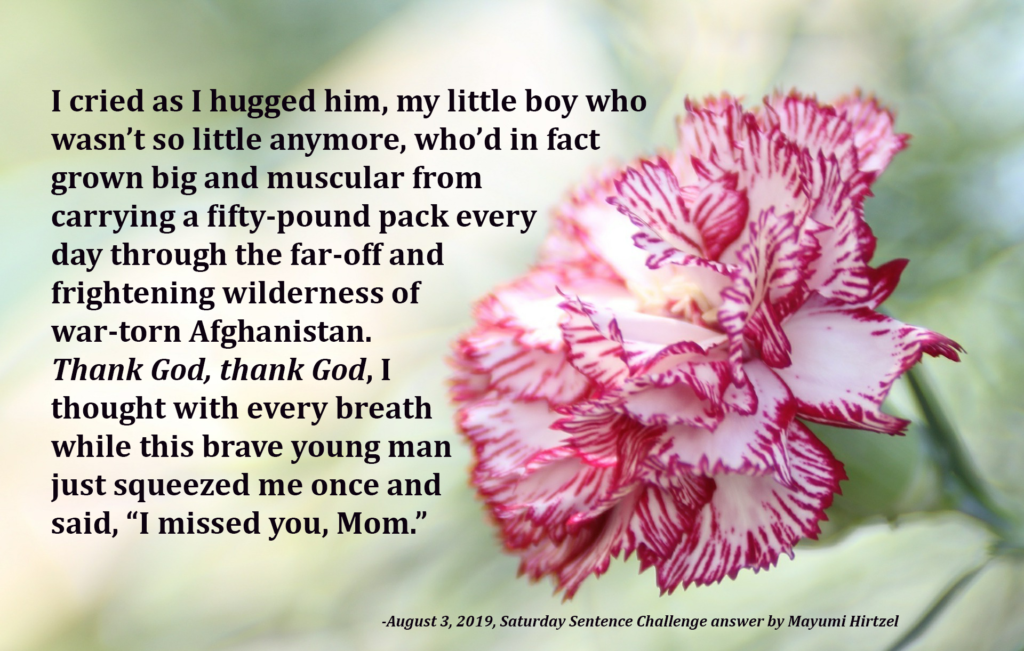
This week’s Saturday Sentence Challenge prompt over at the #TeamWriter Facebook Page was:
I am so very happy to see him come back all in one piece.
The first thing that struck me about this prompt? How the words should evoke a feeling of happiness or relief. However, the sentence construction, which is very stilted, made me feel nothing at all. There’s also the cliche of the phrase “all in one piece.” I believe that cliches become cliches because they’re true. I also think we can use them in our writing, so long as it’s done sparingly and to effect. Or humorously, though satire is a completely separate conversation.
As I’ve mentioned before, I try not to spend too much time on a Saturday Sentence Challenge prompt. Usually, I need at least a few passes before I get the right words. For this one, though, the sentences popped nearly fully-formed into my head on first thought.
Immediately, I knew whose voice I wanted to use for this prompt: June McAllister. June is the mother of one of my “Finding Mister Wright” protagonists, Rob, who spent time in the US Army. I got an image of Rob returning home, and June taking him in her arms. The powerful emotions associated with a mother hugging her son on his safe return home from a tour of duty filled my own heart with sympathetic joy.
I’m actually pretty proud of my answer to this particular prompt, which you can also read below (for sake of text-only accessibility):
I cried as I hugged him, my little boy who wasn’t so little anymore, who’d in fact grown big and muscular from carrying a fifty-pound pack every day through the far-off and frightening wilderness of war-torn Afghanistan. Thank God, thank God, I thought with every breath while this brave young man just squeezed me once and said, “I missed you, Mom.”
Happy writing to you this week, whether it’s your own or prompt-driven!
by Mayumi-H | Jul 20, 2019 | Writing Challenges
I’ve talked about writing coach/author/editor Kate Johnston‘s Team Writer Saturday Sentence Challenge before. Briefly, each week, Kate offers members of the group a boring or grammatically-troubled sentence which we are tasked with sprucing up. The challenge is that we can only push this to two sentences, and we’ve got to make the reader feel something. This particular week, Kate provided a familiar cliche:
The thought passed through his mind.
Now, I’ve got a lot of characters who have a lot of thoughts crossing their minds. Some thoughts are crazy, others romantic, still others devious. For this particular prompt, my brain originally went a different way, with a different character, but the details in that first attempt went way off into deep raunch, I didn’t think it appropriate to share with mixed company. Still, I’ve always liked the idea of forbidden attraction. I just took it in a slightly different direction. Here’s what I wrote, as begun in the image above:
Firelight danced over the mechanic’s face, adding a glow to her smooth brown cheeks and full, glossy lips, and in that moment the hunter wondered how soft that cheek would feel if he stroked it, and how silky those lips if he kissed them. But then her husband sat down between them and, well, that was the end of that.
Of course, that’s not quite the end of that particular story. But sharing the ensuing details to that scene will have to wait for another day.
Did this Saturday Sentence Challenge answer from me make you feel anything? Have you partaken of any writing challenges, lately? Share your thoughts in the comments!
by Mayumi-H | Mar 26, 2019 | Writing Challenges
The Setup
Every week, writer and writing coach Kate Johnston sends out to her TeamWriter Facebook group her Saturday Sentence Challenge. It goes like this:
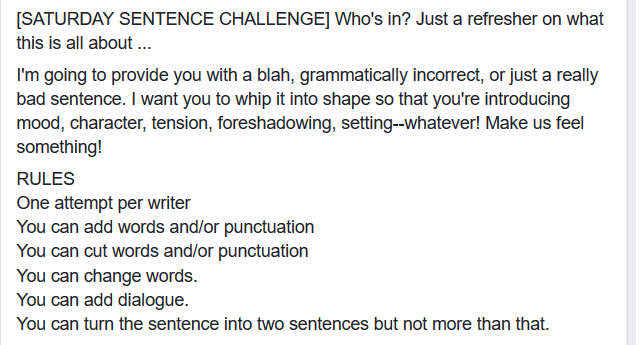
As you can see, Kate challenges members of the group to take her provided “blah, grammatically incorrect, or just…really bad sentence” and tweak it into a sentence (or two, at the most) that encourages the reader to feel something. We can add or cut words and punctuation, change words, even add dialogue.
I love challenges like this because they’re short, simple, and often a refreshing change of pace from my current in-process projects. They offer an opportunity to step into another world or a different character’s shoes. This sidestepping, as it were, can even lead to new storylines, characters, and adventures down the road!
Last Saturday, Kate’s blah sentence prompt was:
The pie is really good.
The Process
When faced with a prompt, I let my brain romp freely until it stumbles over an idea with teeth. I don’t let it romp too long, though; with more than one longer-form project on my plate, I can’t afford to get too distracted. Luckily, Kate’s prompts come with enough leeway to go in lots of different directions, and I can usually find the direction I want to take within a few minutes. Tweaking takes more time, of course…but that’s what the challenge is about!
I’ve got a document where I keep these prompts, my process attempts, and my final results. It’s neat to be able to look back on them! And as I said before, I never know when a simple prompt idea might come back to me with greater force.
The Wrap-Up
It didn’t take long for this latest prompt – The pie is really good – to tickle my brain. I usually try to keep my group posts and prompt shares on the safe side, but this one went in a naughtier direction. It seemed only fitting: I’m at a point in one of my larger projects where romance is coming to the fore, and my writing mind is working through that. Thus, this result:
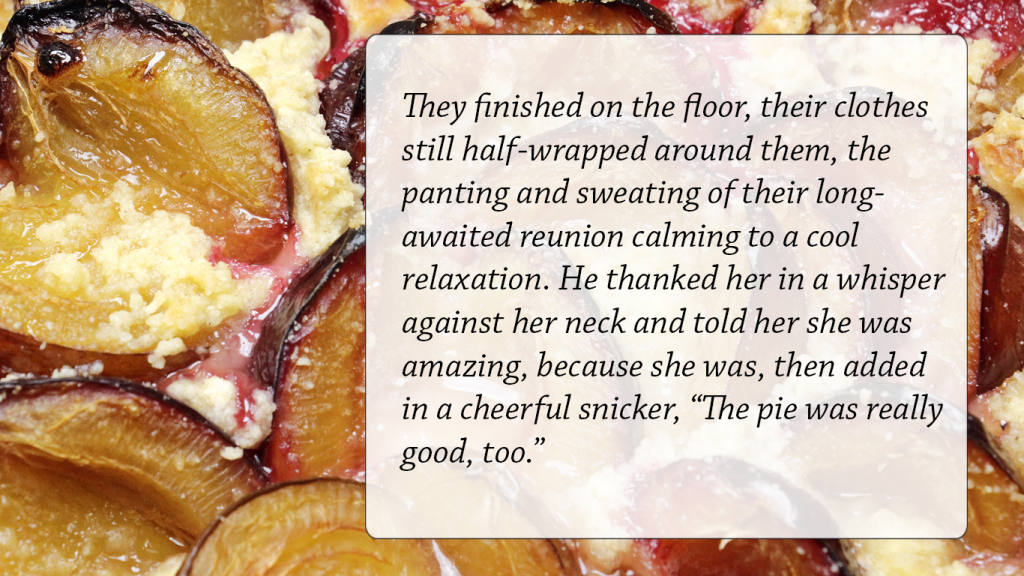
If you’d like to join in on the fun of Saturday Sentence Challenges – and more! – check out Kate’s Facebook page!
by Mayumi-H | Jul 3, 2018 | It's My Life, Writing Projects
In the last days of December 2017, a friend pointed me toward a writing competition. The theme for the competition was “Awakenings”. The group that posted the competition welcomed all genres, with a great desire for romance and speculative fiction, among others. I’ve written romance in many forms over the years, from the simple to the unapologetically raunchy. I had only a few days before the deadline, but I’d come up with – what I thought at the time – a straightforward love story set in a pseudo-familiar setting, and one I could finish pretty quickly.
Then I actually started to write it.
What poured from my brain was a twisty-turny, upside-down-reality tale of love, duty, patriotism, relationships, even politics(!) that took nearly a full five months to finish. It wasn’t what I had first planned, and it veered a lot from my original plot. But one lesson I’ve learned through writing fiction is that, when I allow the characters to speak freely, they will forge their own path. More often than not, that path is more satisfying than any I may have planned at the start.
Number Seven
Seven, like so many of my original characters, embraced his being-ness with so much quiet strength and determination, it overwhelmed me. I could think of no other story or character for those five months I wrote. In fact, writing became almost like transcribing. Many times, it felt like he was standing at my shoulder, telling me who should do what and what should happen next. That letting-go is one of the most joyful feelings I’ve experienced as a writer.
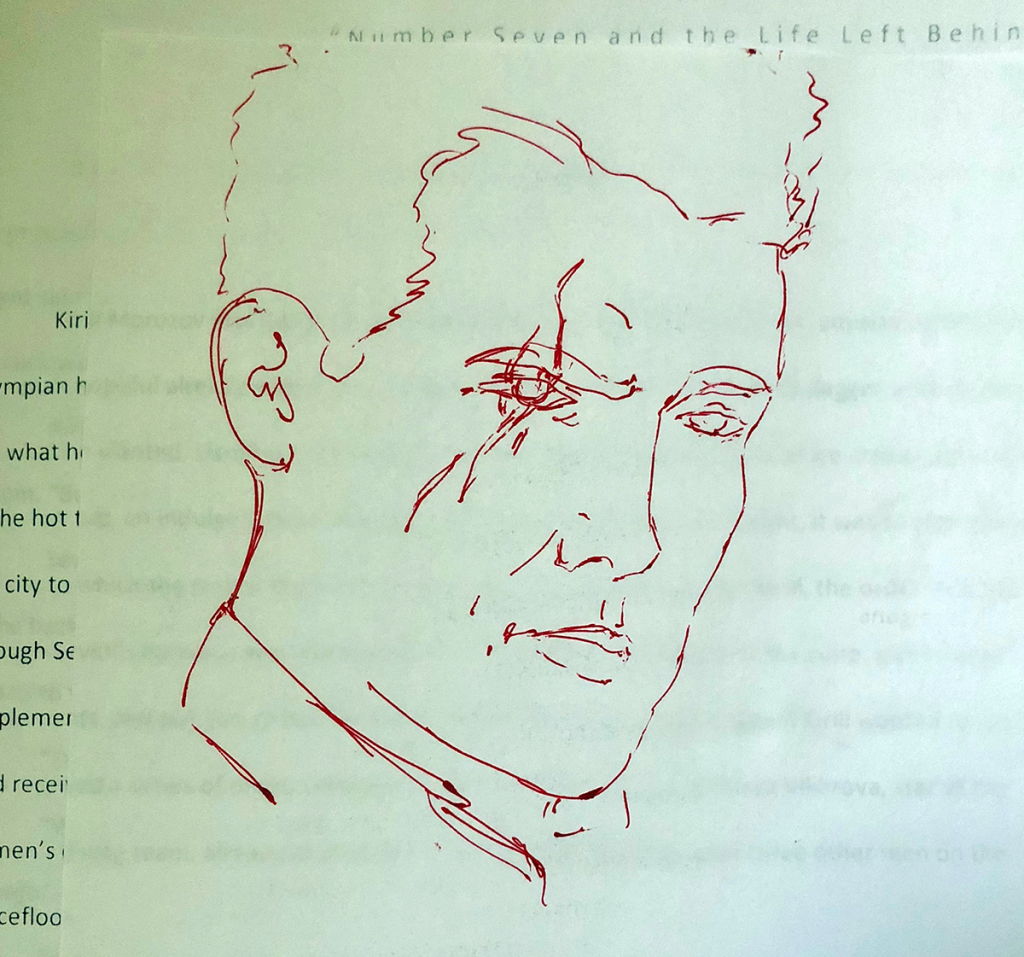
Dour Number Seven, a doodle by me.
I said I wouldn’t apologize for Seven’s story, and I won’t. He took me on a new journey into personhood, one I hadn’t considered before. I grew with him, and because of him. He made me open my eyes a little bit wider to the world around me. He’s a bit suspicious, as I am, and he’s quite the serious individual, as I can be. But he also has to trust himself, a lesson I took to heart along the way, too.
If any of this has piqued your interest, you can read “Number Seven and the Life Left Behind”, part 1, here.
What’s Next
I’ve posted this story for free because it’s a project I want to share with people. I am working on a hardcopy version, and when that’s available, I’ll be sure to share that news. In the meantime, if my story moved you at all, I’d encourage you to take a moment to consider where you are in the world today, and what struggles you see, nearby or faraway, hidden or in plain sight. Everywhere, there are people fighting the good fights: for freedom, equality, and love. This story is for them. And for me, and for you, because we’re all in this together.
Now,Thanks
A writer rarely creates a story in a vacuum. People influence us in their own ways. Sometimes, that influence makes it onto the page. Sometimes, it helps us just get to the page in the first place.
Thank you to Sue for giving me the impetus to write this story.
Thank you to Chase for joining me for the ride.
Your thoughtfulness and support means a lot to this lonely writer. 🙂
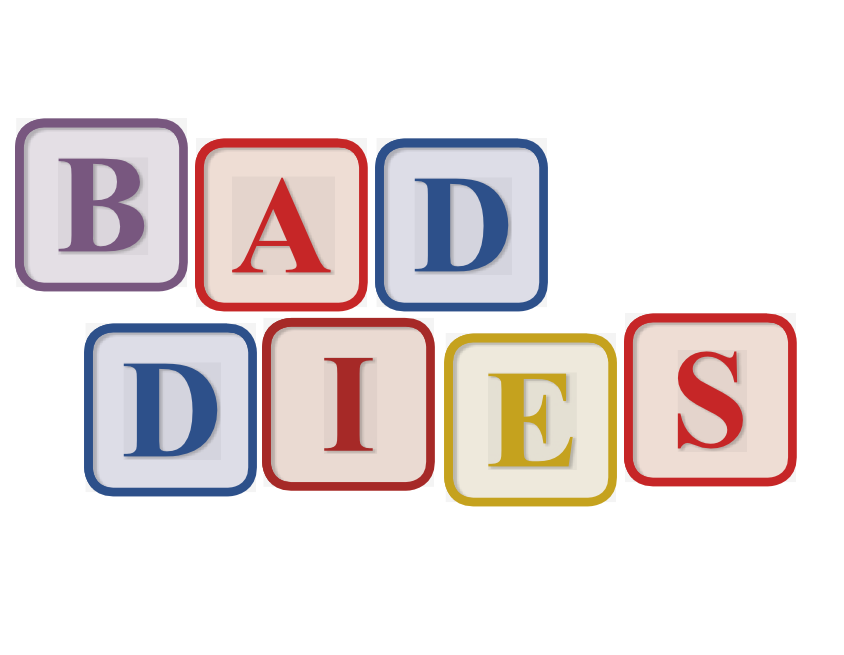



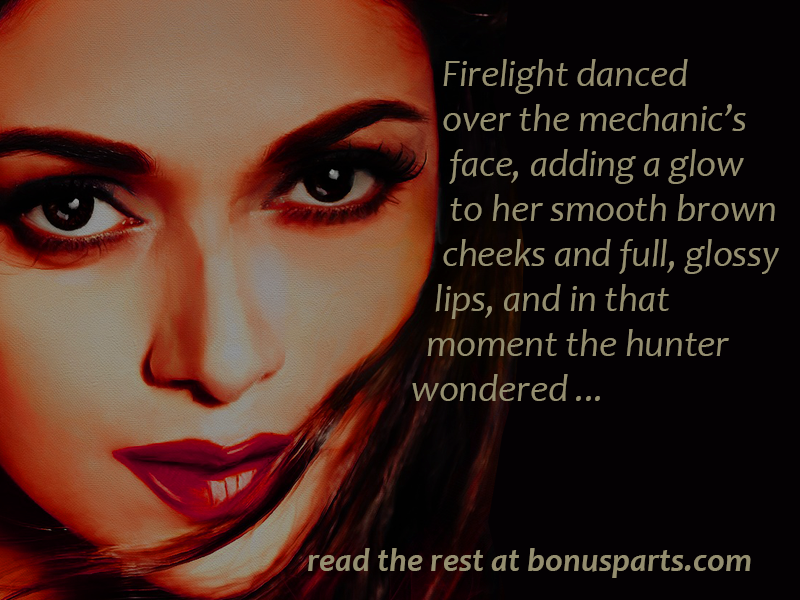



Recent Comments